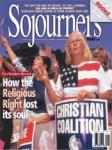Elisabeth Schussler Fiorenza won’t be silenced by critics, within and outside of feminist biblical scholarship, who consider her work passT. With integrity, grace, and academic moxie, the Harvard Divinity School professor devotes much of Sharing Her Word: Feminist Biblical Interpretation in Context to critiquing critics of her scholarship. She says they either misinterpret her scholarship or condescendingly dismiss it as part of an early, bygone wave of feminist biblical theology.
Readers who aren’t familiar with Fiorenza’s previous groundbreaking works—In Memory of Her, Bread Not Stone, and But She Said—may feel lost at first, like they’ve stepped into the middle of a heated argument. And Fiorenza’s scholarly feminist terminology, which often goes undefined, may also be a hurdle. But those who plod ahead will be engaged and challenged by this provocative, sharp-witted thinker.
Fiorenza admits that biblical religions have played significant roles in emancipating as well as oppressing women. She argues that to dismiss these religions as hopelessly destructive sets up agnostic or atheistic feminism as superior to religious feminism. It also overlooks the reality that for millions of women, religion is still meaningful, liberating, and affirming, she says.
Women have made substantive gains within churches over the past three decades, achieving access to ordained ministry, academic theological positions, and other leadership roles previously unavailable to them. Even so, Fiorenza says, they are overwhelmingly relegated to low-ranking, low-paying positions where they often serve as mouthpieces for theologies and structures that marginalize them. Likewise, "success" in male-dominated academies often depends on how well feminist scholars can promulgate the very "malestream theories and theologies" they seek to transform.
"The central feminist theological problem today," Fiorenza writes, "is the question of whether it is possible to change hierarchical religions and to articulate theology in such a way that it does not continue to foster wo/men’s exploitation and self-abnegation. It is no longer ‘the woman question’ that moves feminist studies in religion. Rather, it is the question of whether religious institutions and theological disciplines can be changed, redefined, and transformed."
This, of course, is an age-old question among feminist theologians, which at its heart taps the tension: Is there a conflict between being a woman and being a Christian? Fiorenza frames it this way: "Is it possible that both poles—being a Christian and being a feminist—can be kept in a fruitful tension, so that my being a Christian supports my liberation struggle and, conversely, my being a feminist supports my Christian engagement for the realization of justice and love?"
BIBLICAL INTERPRETATION has been the site of much of the feminist struggle. Fiorenza argues that well-meaning scholars who try to save the Bible from so-called sexist texts and recast them as well-intentioned passages are misguided. And, she says, because of the male bias within texts, feminists cannot count on scripture alone (i.e. Protestant methodology) for their authority. Nor can that authority come from church hierarchies either (i.e. the Catholic approach).
Fiorenza insists that feminists must claim their own spiritual authority to evaluate oppressive as well as liberating dimensions of biblical texts. By that authority they can challenge the Christian traditions that advocate the politics of unconditional love, sacrifice, and subordination, which she says are used to justify violence against women on theological grounds.
Of course, there’s much more to this book. Some of the material is a rehash of statistics showing how eating disorders and domestic violence, for example, affect women disproportionately more than men. Occasionally, Fiorenza makes sweeping statements that shouldn’t go unchallenged. But overall, this is a compelling book. It’s about feminism and it’s about justice. —Susan Hogan/Albach
Sharing Her Word. Fiorenza, Elizabeth Schussler. Beacon Press, 1/1/99.

Got something to say about what you're reading? We value your feedback!